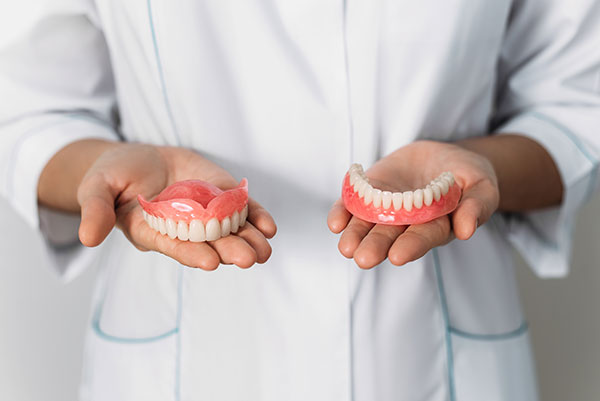Dentures in Kennett Square, PA
Dentures Are a Convenient and Affordable Solution for Missing Teeth
If you’re suffering from tooth loss due to decay, injury, or other reasons, don’t worry! Dentures are a great option to help you eat, speak, and smile with confidence. At Kennett Center for Advanced Dentistry, our Kennett Square dentist offers dentures, which are available in different types and styles, so we can help you choose the one that works best for you.
We’re proud to restore the smiles of patients in Kennett Square, PA. Contact our top-rated dentist today by calling 610-444-6311. We’ll get your smile where you want it to be.

What Are Dentures?
Dentures are a type of dental prosthetic device used to replace missing teeth. They’re removable and custom-made to fit the unique shape and structure of the patient’s mouth. Dentures are typically recommended for individuals who have lost a significant number of teeth due to decay, injury, or age-related issues.
Types of Dentures
There are several types of dentures available today. Depending on your dentist, they may recommend any of the following dentures:
- Complete Dentures: Also known as full dentures, complete dentures are used when all natural teeth in the upper or lower jaw are missing. They’re custom-made to fit the unique shape and structure of the patient’s mouth.
- Partial Dentures: Partial dentures are used when some natural teeth are still present. Removable partial dentures attach to the remaining natural teeth and fill in the gaps where teeth are missing.
- Immediate Dentures: Immediate dentures are made before natural teeth are removed and are designed to be placed immediately after tooth extraction. They can be worn temporarily while the gums and bone heal and a permanent denture is made.
- Implant-Supported Dentures: Implant-supported dentures, also known as overdentures, are attached to dental implants that are surgically placed in the jawbone. This provides a more stable and secure fit for the denture.
- Snap-in Dentures: Snap-in dentures are similar to implant-supported dentures, but they attach to mini-implants that are less invasive and less expensive than full dental implants.

How Do You Know Which Dentures Are Right for You?
Choosing the right dentures can be a daunting task, but with some guidance and consideration, you can make the best decision for your oral health needs.
Some factors to consider when selecting your new dentures include:
- Your budget: The cost of dentures can vary depending on the type of denture and materials used. Make sure to determine your budget before choosing a denture type.
- The material: Denture teeth can be made from different materials, such as acrylic, porcelain, and metal. Each material has its benefits and drawbacks, so consider which material is best suited for your budget, comfort, and aesthetic preferences.
- Oral health: Your overall oral health is a key factor in determining the type of denture that’s right for you. If you have significant bone loss, for example, implant-supported dentures may be a better option than conventional dentures.
- Number of missing teeth: If you’re only missing a few teeth, partial dentures may be your best option, whereas if you’re missing most of your teeth, complete dentures may be recommended.
- Lifestyle factors: Consider your lifestyle and how your dentures will fit into it. For example, if you’re very active and participate in sports or other physical activities, you may want to consider dentures that are designed for greater stability and durability.
- Consult with your dentist: Your dentist is your best resource when it comes to choosing the right dentures. They’ll evaluate your oral health, discuss your goals and preferences, and determine your candidacy for dentures.
Benefits of Dentures
While there are various tooth replacement options available, dentures offer multiple benefits, including:
- Restored speaking and chewing ability
- Aesthetic Enhancement
- Affordability
- Non-Invasive
- Ease of Maintenance
- Versatility
- Quick Restoration
- Bone Preservation
- Reversible Option
- Functional Improvement
The Denture Process
The denture process involves an initial consultation and assessment by a dentist, followed by the development of a personalized treatment plan. Impressions of the mouth are taken, and for full dentures, a wax try-in is conducted to check fit and alignment. Artificial teeth are selected and placed on a framework for partial dentures. The final denture is fabricated with a comfortable fit and natural appearance, and adjustments are made during a fitting appointment.
Depending on the denture type you receive, the process may be a bit different. For example, if you’re getting overdentures, you’ll need to get dental implants first before the dentures are placed. Our Kennett Square dentist will go over the procedure with you after deciding on the best type of denture for your oral health.
Cleaning Dentures
Cleaning your dentures is essential to maintain your oral health and keep your dentures looking and feeling fresh. Proper care can extend the life of your dentures and prevent complications. Here are a few things to keep in mind:
- Rinse dentures after eating
- Handle with care
- Brush daily with a soft-bristled brush
- Soak overnight with a denture cleaner
- Rinse dentures thoroughly
- Clean any existing teeth
- Visit our dentist for regular exams and cleanings
Cost of Dentures
On average, basic dentures may range from $600 to $1500 per arch. Premium dentures can cost between $2000 to $4000 per arch. These prices can differ based on location and the specific dental practice. Additional expenses for consultations, adjustments, and maintenance should also be considered. Dental insurance may help cover some costs.
To learn more about the costs of dentures, contact our dentist today.

Frequently Asked Questions
Can I eat with dentures?
Yes, you can eat with dentures, but you may need to make some adjustments to your diet. Initially, it’s best to stick to soft foods and cut them into small pieces to make them easier to chew. Over time, you can gradually introduce more challenging foods, but you should avoid very hard or sticky foods that could damage or dislodge your dentures.
Can I sleep with my dentures in?
While it’s possible to sleep with your dentures in, it’s generally not recommended. Removing your dentures at night allows your gums and mouth tissues to rest and recover from the pressure of the appliance during the day. It also allows you to clean and care for your dentures properly.
How do I adjust to wearing dentures?
It may take some time to get used to wearing dentures, especially if you’re new to them. You may experience some discomfort or soreness in the first few weeks you wear dentures, but this should improve as your mouth adjusts to the new appliance. Make sure to follow your dentist’s instructions and wear your dentures as directed to help your mouth adapt to the change.
Schedule a Consultation With Dr. Peter Patellis
At Kennett Center for Advanced Dentistry in Kennett Square, we understand the importance of a healthy and confident smile. Our dentists are dedicated to providing personalized and comprehensive care to patients who need dentures. Our state-of-the-art facility is equipped with the latest technology and materials to ensure that your dentures are comfortable, natural-looking, and long-lasting.
Contact us today at 610-444-6311 or fill out our online form to schedule a consultation and discover how we can help restore your smile and confidence with dentures.
